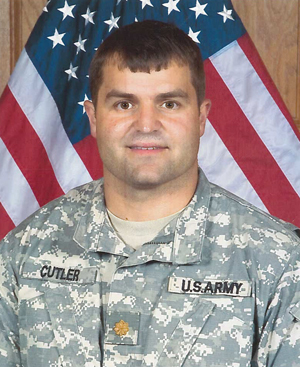Learning to lead: Microsoft director’s success started in the Army
Wyatt Cutler has always been a leader. Whether it was on sports teams, as a major in the Army or in his current role as director of talent management at Microsoft, Cutler is at his best when he’s helping others succeed. He decided to harness that natural ability to lead when the United States Military Academy recruited him to play football. But it takes more than natural ability — to lead organizations with the size and scope Cutler did while in the Army requires education, training and learning by experience. The Military Academy provided the education and training. And, after graduating in 1998, Cutler got the experience — he went straight into a role as platoon leader.
“One of the things I love about the military is that you get a tremendous amount of responsibility at a very young age with very limited experience,” Cutler says. “It kind of throws you into the fire, and you have to learn quickly, you have to adapt quickly and you have to lead by example. That’s how you gain credibility with people in the military.”

Cutler says that the decision-making and problem-solving skills he developed while in the Army are also invaluable to him in his current role. Though the stakes aren’t as high — if you make the wrong decision at Microsoft, no one gets physically hurt — a disciplined approach to planning, execution and taking stock of what did or did not go well after the fact is a method Cutler continues to rely on at Microsoft. And, along with the confidence to make tough decisions and take appropriate risks, Cutler says his time in the military has made him confident in presenting and defending those decisions to others at Microsoft — even folks in very senior positions.
“You interact with high-level leaders in the military earlier in your career than you would in the corporate world,” Cutler says. “I’m used to briefing colonels and, in some cases, generals on courses of action. So I’m very comfortable presenting an idea and explaining my recommendations to senior-level executives now.”
Having that sort of responsibility at a young age comes with its own set of challenges. You often end up in charge of people who have many more years of experience than you do. Cutler says that’s why it’s so important to have a growth mindset: to come into it with a certain amount of humility and to focus on learning and growing.
“You can’t be a know-it-all when you are in a leadership position in the military; you have to be humble, you have to learn, and you have to be willing to roll up your sleeves and do the work,” Cutler says. “If you go into that kind of situation thinking you know everything, people are going to see right through it and you’re not going to be successful.”
That mindset has served Cutler well, not only in his 12-year Army career, but also in his post-military career. “Typically in organizations in the civilian sector it takes 15–20 years to get into the same type of leadership responsibility that you do in the military after a short amount of time,” he says. “At the end of the day, you look those people in the eye, and they’re counting on you to be a good leader. If you’re not, they’ll move on and find somebody else who will.”
Recognizing and being able to describe those valuable skills to potential employers is what helped Cutler land the type of job he wanted when he decided to transition out of the Army. Figuring out what it is that you want to do, and going after it, is the most important thing service members can do when they begin preparing for their own transition, Cutler says.
“Do something that you love. Because the transition out of the military is hard, and if you don’t enjoy what you’re doing, you’ll be miserable,” he says. “It’s not always the highest-paying job; it’s finding a place where you’re happy, where the work-life balance is there, where the company does meaningful work. Whatever it is that’s important to you, lay those criteria out and be really selective when you begin your search.”

For Cutler, Microsoft has checked all those boxes. Though he misses the camaraderie and mutual accountability that comes with service, he says he tries to create that same sort of environment with the team he leads now.
“In the military, you understand that it’s not about you. It’s about helping each other be successful,” Cutler says. “People are counting on you to do your job, do it well, and do it on time. Their lives depend on it. At Microsoft, I’ve tried to create that same sense of responsibility: a team where everyone really cares about the success of other people, where we have a common goal we’re shooting for and we have fun doing it. You go home feeling satisfied about what you’ve accomplished together. It’s so much more rewarding than an individual accomplishment.”
